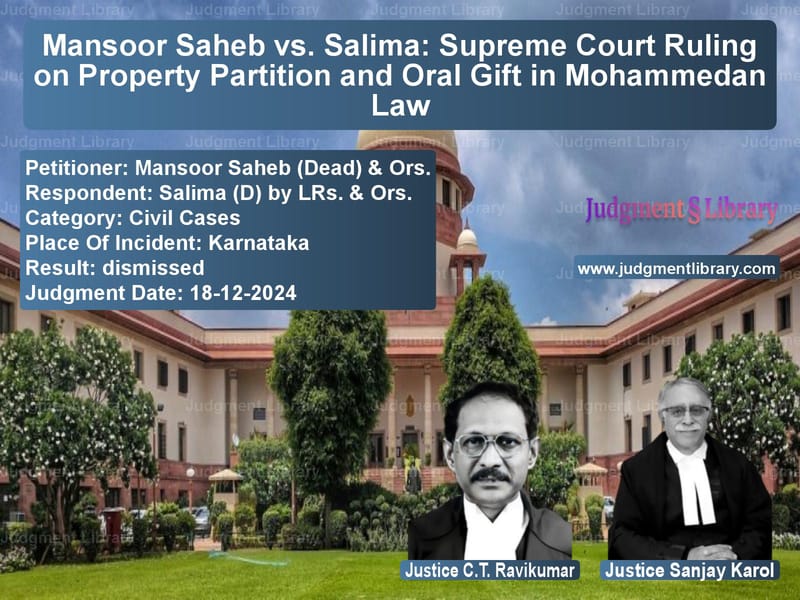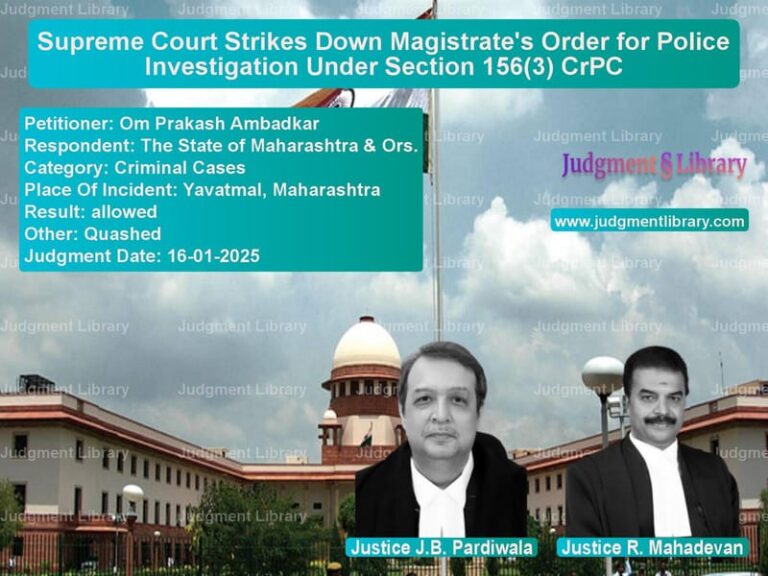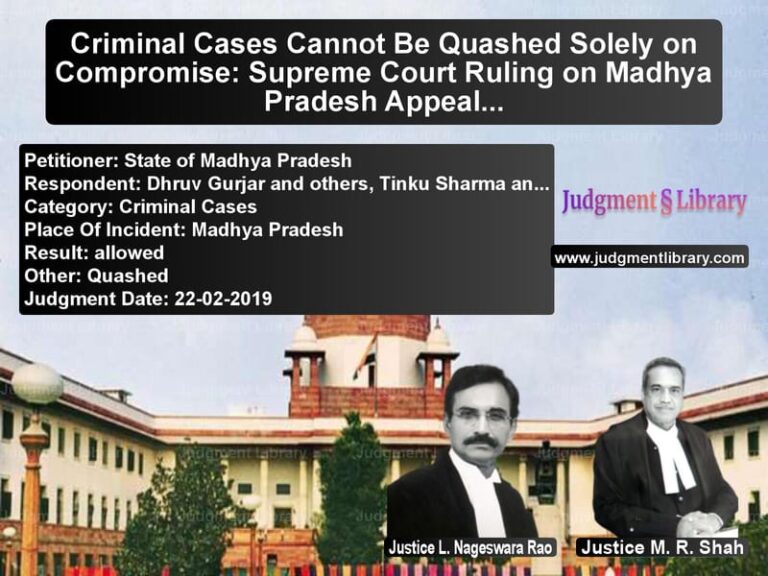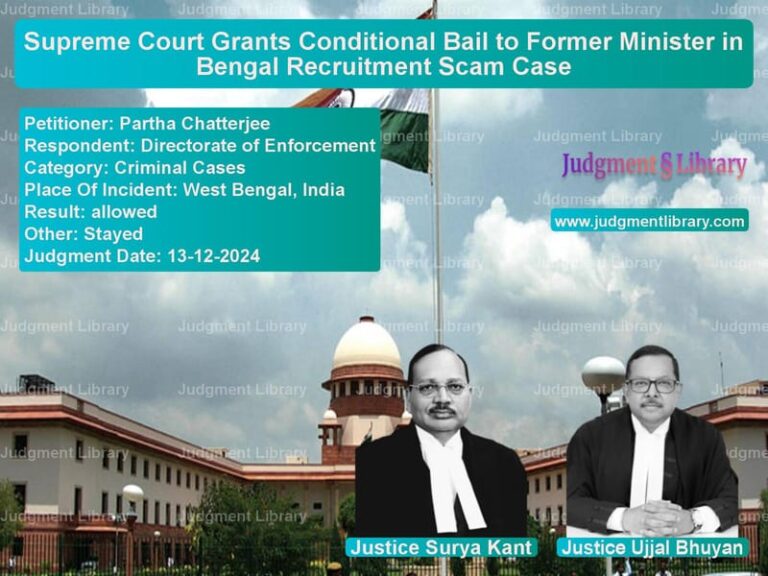Mansoor Saheb vs. Salima: Supreme Court Ruling on Property Partition and Oral Gift in Mohammedan Law
The case of Mansoor Saheb (Dead) & Ors. vs. Salima (D) by LRs. & Ors. is a landmark Supreme Court judgment that clarifies crucial aspects of property inheritance, partition, and the validity of oral gifts (Hiba) under Mohammedan Law. The dispute in this case revolved around whether a Muslim owner could validly partition property among heirs during their lifetime and whether an oral gift met the strict legal requirements under Sharia Law.
This judgment has broad implications for property disputes within Muslim families, ensuring that inheritance distribution adheres to well-established principles of Sharia Law. It also addresses the evidentiary requirements for proving an oral gift and the legal limitations on self-declared partitions by property owners before their death.
Background of the Case
The dispute arose after the death of Sultan Saheb, the original owner of the suit property, which included agricultural land and a residential house. Sultan Saheb had four children from two marriages. The plaintiffs, Salima and others, claimed that they were rightful heirs and were entitled to a share in the property under Mohammedan Law.
However, the defendants contended that Sultan Saheb had already partitioned the property among his sons before his death and had also made an oral gift (Hiba). The defendants relied on a mutation entry dated 21.01.1973 to claim that the property had been transferred to them through an oral gift.
Key Legal Issues
- Whether a Muslim property owner can partition property among heirs during their lifetime.
- Whether an oral gift (Hiba) was legally valid under Sharia Law.
- Whether a mutation entry is sufficient to establish a valid transfer of ownership.
Trial Court’s Findings
The Trial Court examined the evidence and legal principles related to Muslim inheritance law. The key findings were:
- A valid oral gift (Hiba) under Mohammedan Law requires three essential conditions: declaration, acceptance, and delivery of possession.
- The mutation entry relied upon by the defendants did not establish a valid oral gift as there was no evidence of acceptance or delivery of possession.
- Partition among heirs during the lifetime of a Muslim property owner is not recognized under Mohammedan Law, as inheritance is governed by Sharia principles.
- The plaintiffs were legally entitled to a 1/6th share in the disputed properties.
High Court’s Decision
The Karnataka High Court upheld the Trial Court’s findings, emphasizing that:
- Under Mohammedan Law, property remains the absolute ownership of an individual until death.
- The oral gift (Hiba) was not proved as there was no clear declaration, acceptance, or possession.
- A partition among heirs before death is invalid and does not override the principles of Sharia Law.
Supreme Court’s Analysis
The Supreme Court examined the principles of oral gifts and inheritance under Mohammedan Law. It relied on key precedents such as:
- Hafeeza Bibi v. Sk. Farid – Emphasizing the strict three essentials of an oral gift.
- Abdul Rahim v. Sk. Abdul Zabar – Holding that a mutation entry alone does not establish ownership.
- Shayara Bano v. Union of India – Recognizing the protection of personal laws under the Constitution.
The Court reaffirmed:
“An oral gift must be proven beyond reasonable doubt by establishing declaration, acceptance, and delivery of possession. Mere mutation entries do not confer legal ownership.”
Final Judgment
The Supreme Court ruled:
- The partition claim was invalid as inheritance under Mohammedan Law only opens after death.
- The oral gift (Hiba) failed as the defendants did not provide evidence of acceptance and delivery of possession.
- The mutation entry did not constitute a valid transfer of ownership and was merely a record of revenue purposes.
- The plaintiffs’ claim for a 1/6th share in the property was upheld.
Conclusion
This judgment reinforces the core principles of inheritance under Mohammedan Law. It clarifies that:
- Heirs do not have a vested interest in property before the owner’s death.
- Oral gifts (Hiba) must meet strict conditions to be valid.
- Mutation entries do not establish ownership under Sharia Law.
The Supreme Court’s ruling ensures that property disputes in Muslim families adhere to established legal and religious principles, protecting the rights of heirs and preventing unlawful deprivation of inheritance.
Petitioner Name: Mansoor Saheb (Dead) & Ors..Respondent Name: Salima (D) by LRs. & Ors..Judgment By: Justice C.T. Ravikumar, Justice Sanjay Karol.Place Of Incident: Karnataka.Judgment Date: 18-12-2024.
Don’t miss out on the full details! Download the complete judgment in PDF format below and gain valuable insights instantly!
Download Judgment: mansoor-saheb-(dead)-vs-salima-(d)-by-lrs.-&-supreme-court-of-india-judgment-dated-18-12-2024.pdf
Directly Download Judgment: Directly download this Judgment
See all petitions in Property Disputes
See all petitions in Succession and Wills
See all petitions in Contract Disputes
See all petitions in Judgment by C.T. Ravikumar
See all petitions in Judgment by Sanjay Karol
See all petitions in dismissed
See all petitions in supreme court of India judgments December 2024
See all petitions in 2024 judgments
See all posts in Civil Cases Category
See all allowed petitions in Civil Cases Category
See all Dismissed petitions in Civil Cases Category
See all partially allowed petitions in Civil Cases Category







